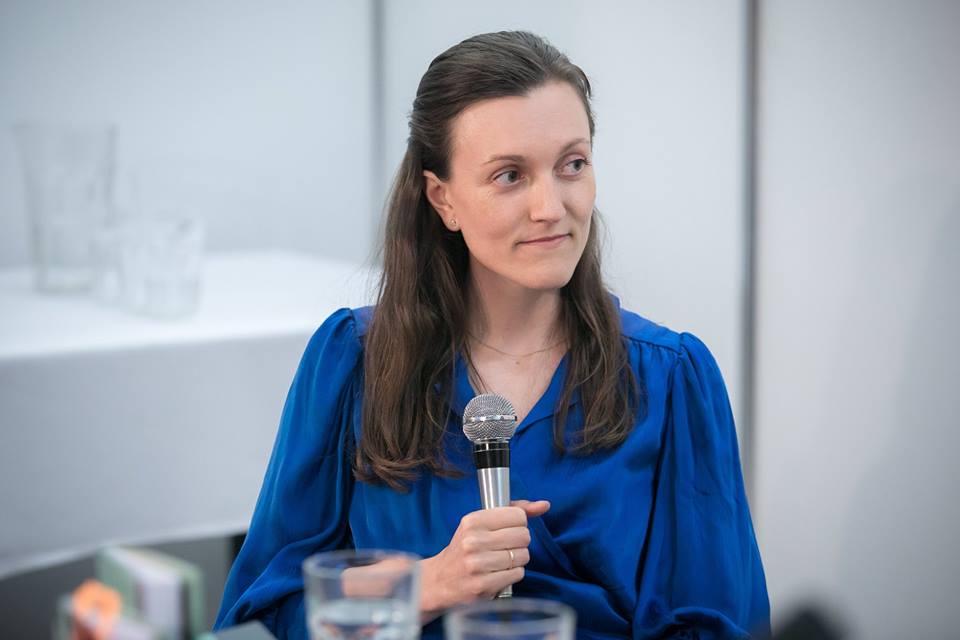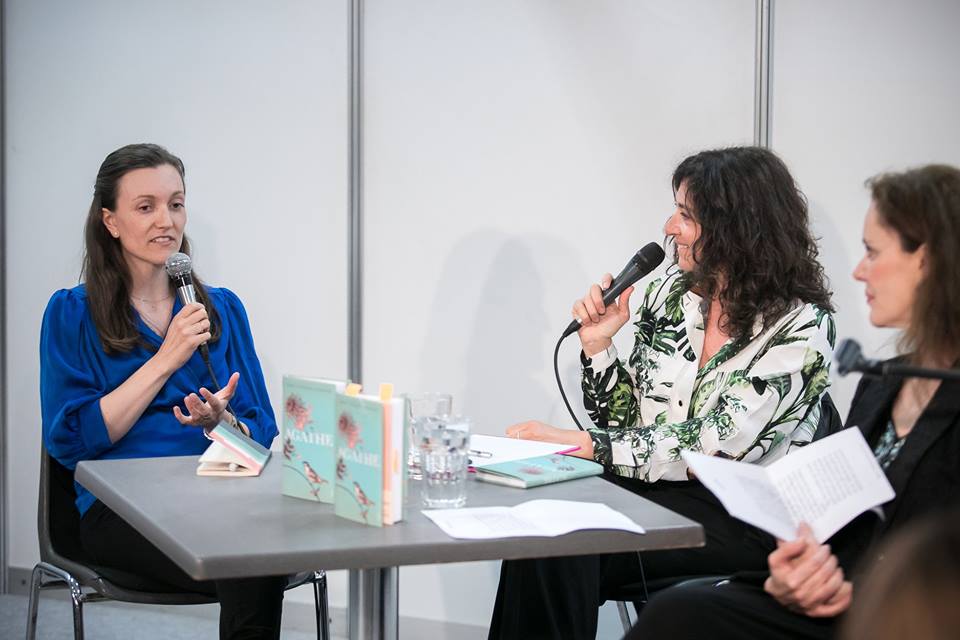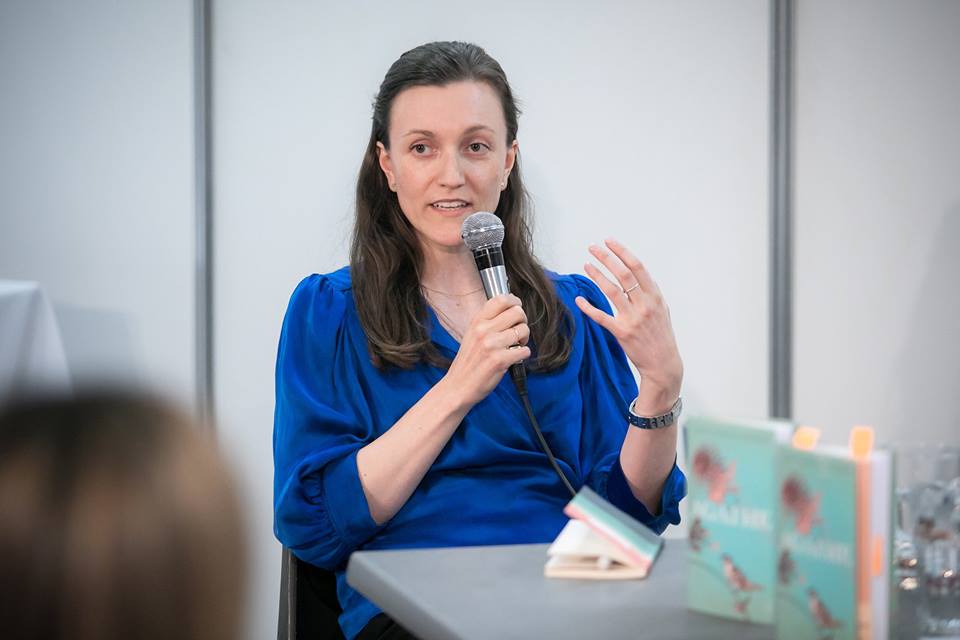“Deep, meaningful human relationships can counterbalance the burden of life”
The little bird completes the winding tendrils on the cover, giving a fleeting impression on the multi-layered and exquisite symbolism of the short novel. The enticingly light and pastel-coloured artwork might recall a novel for girls, but don’t judge this book by its cover: Agathe deals with serious, deeply philosophical questions – and the answers are not always easy to digest. The story takes place in Paris in the 1940s, though it is only revealed somewhere in the middle of the book and has no relevance on the plot that discusses timeless topics like loneliness, lack of being loved and sorrow.
A practicing psychologist writes a short novel on a psychiatrist. This setup is way not as simple as it seems. The protagonist of the novel is a lonely, burnt out doctor on the verge of his retirement; the author, Anne Cathrine Bomann (1984) works only half-time as a psychologist so that she can spend more time on writing. Agathe was published in Danish in 2017, and it has been translated to almost twenty languages. The Danish writer was one of the guests of the European First Novel Festival at the 26th International Book Festival in Budapest, where we asked her about writing, books and the challenges of being a psychologist.
The title – Agathe – is a bit deceiving, as our main focus in the novel is not that of the eponymous character but her psychiatrist. He is a lonely, cynical, burnt-out character who counts down the days until his retirement. This setup is quite interesting as you also work as a psychologist. How did your professional experiences shape the narration?
I never thought about that while I was writing the novel. Now, as I’m rereading it, I can see some smaller – or bigger – examples how my own professional background influenced it. There are some instances that made me think. The protagonist of the novel has some difficulties talking with his grieving patients who lost one of their loved ones. I myself also find these sessions really hard. I also have to admit that you don’t look forward to each consultation with the same enthusiasm: there are patients with whom you are actually excited to talk while others, let’s face it, somewhat annoying. Another controversial issue is that you accept money from someone who you are supposed to help, even if you know that no matter how hard you try, you will not be able to do so. So there’s a lot of stuff the doctor is facing I also experienced in my practice.
So, on a certain level, Agathe has some biographical elements to it, some sort of a reflection on what you had experienced as a psychologist.
Practically yes, but it’s definitely not some sort of hyper-realistic mirror image of myself. The tone and the intensity of the feelings are changed. My old, male doctor is much lonelier and melancholic, and, in some aspect, way worse than me: he can’t even pay attention to his patients, his main characteristic is a serious burnout that I, fortunately, have never experienced. I lent many of my thoughts to him, but he’s not me.
There is an intricate system of symbols interwoven with the main plot, and sometimes it is quite emphasised. For example, the doctor draws birds during the sessions, more precisely, a bird that he somehow considers similar to the patient he is unable to pay attention to. Furthermore, some scenes take place almost in this symbolic universe. This dimension of the novel was intentional from the beginning or it was developed later?
I hadn’t prepared a proper plan before I started writing, and this part of the novel, so to say, created itself. When I started working on the text, I concentrated on the writing, not on some sort of grandiose interpretation or universal ideas that I will incorporate into the novel. Nevertheless, it was quite interesting to realise that they were there when I read through the first draft. So when I rewrote the text, I used them more knowingly: there were times when I pushed these symbols to the front while other times I dissolved them in the background or cut them out entirely. But, all in all, it wasn’t a result of a deliberate decision, I just realised the opportunity.
What was the biggest challenge during the writing?
I didn’t want to fall into the cliché trap. Agathe is dealing with serious existential issues, and there was a danger that I’d end up drowning the plot in commonplaces. So I decided to tone down this abstract, philosophic level. Of course, the important, definitive questions are there, but I didn’t want them to be overtly direct.
Occupational or private burnout, that is, burnout-syndrome is one of the central topics of the novel. How familiar are you with this phenomenon?
Luckily, I don’t have first-hand experience, but you’re right, I have met patient with this diagnosis. In the case of my protagonist, however, it is much stronger than people usually have it. He is unable to feel anything; he doesn’t have any positive thoughts. He is not only unwilling but uncapable to get involved in the world around him. On the one hand, he’s been practicing for decades, and he has seen every human problem, weakness and disorder a thousand time. On the other hand – and I think that’s the main reason behind his suffering – his private life is empty and gloomy. He has no human relationships outside his work. He invests all of his energy into his practice, he undertakes eight-ten sessions a day, he’d like to help everyone, but he feels like he is unable to do so, and he just finds it too much. Outside his consulting room, however, his life is complete isolation… I think that’s the main difference. Deep, meaningful human relationships can counterbalance the burden of life, and thus I haven’t experienced such an intensive burnout, and I hope I will never do, but I know those feelings that may lead to this state.
As you also said, some aspects of the novel only took shape while writing the text. What was the initial thought, the point of departure from where you built up the story?
The first thing I saw was an old man walking by a lake, all alone. I didn’t know then who he was, only that he is very lonely and sad, maybe even depressed. I don’t have an idea how this image came to my mind. I started writing my next novel the same way, I had some idea about the protagonist.
What inspires you when you write? Not necessarily in the case this novel, but in a general sense.
I find inspiration in my own life. Sure, I’m not actively looking for inspiration, ideas come to me Anyway, the initial thoughts are rooted in the questions that move me in my everyday life. In the case of Agathe such irrefutable, existential problems like loneliness and depression. There are topics that really occupy my thoughts, characters about whom I’d like to know more… And they are the building blocks of my novel. I cannot give you a more conscious, more detailed explanation.
Could you mention a few literary works that influenced your writing? I’m not thinking about your favourite writers, rather those authors whose style or world view might be present in your texts.
It’s a difficult question. I often get it, but I still don’t know what to reply. But let me ask you: could you mention a writer or a poet whose work has changed your life?
Actually, there are a few poets about whom I could say this.
Well, then I will try to give a proper answer, though it won’t be easy. I read so many books, so many great books, and I feel a bit silly, but I’m not able and I wouldn’t like to chose one. I’ve been a bookworm since I was a child, sometimes it wasn’t the book itself that fascinated me, but the act of reading itself. I’m an only child, and while I was very much loved by my parents, I spent a lot of time on my own. I got quickly hooked on reading, and it might sound strange, but these childhood experiences are the most determining. One of them is the Anne Shirley-series by L. M. Montgomery, but I could also mention here the Pippi Longstocking books as well. It’s been a long time since I’ve read them, I’ve read so many books since then, but these early impressions are so long-lasting. I think when you are young and you have seen and read so little, it’s easier to find a book that has an enormous impact on you. As I work and write, I cannot read as much as I would love, and I truly regret it. I miss reading because it was my favourite hobby for a long time, and as such, an important part of my life. Sure, I still read, but much less than before.
You mentioned that you’ve been writing since you’d finished Agatha. What are you working on at the moment?
I’m working on a novel for adults, the story of two psychology students, and it takes place in the near future – let’s say, in five years –; and it discusses whether sadness and sorrow can be cured. These two girls find out that one of the pharmaceutical companies have invented a pill for sadness. There are some philosophical questions as well, mainly what to do with sadness, should we really cure it; whether it is indeed a solution if we just take a pill to make it stop or we should rather accept that it is a part of our life. On the other hand, sadness is suffering, and we should help those who suffer, and a diagnosis with a pill is some sort of aid. Of course, I don’t have concrete answers, but I’d like to explore this idea. I really do hope that these students will save the world, but I’ve only written thirty pages, so anything could happen.
Translation: Beke Cz. Zsolt
Photos by: Dániel Németh; courtesy of Jelenkor Kiadó
Ha tetszik, amit csinálunk, kérünk, szállj be a finanszírozásunkba, akár csak havi pár euróval!



